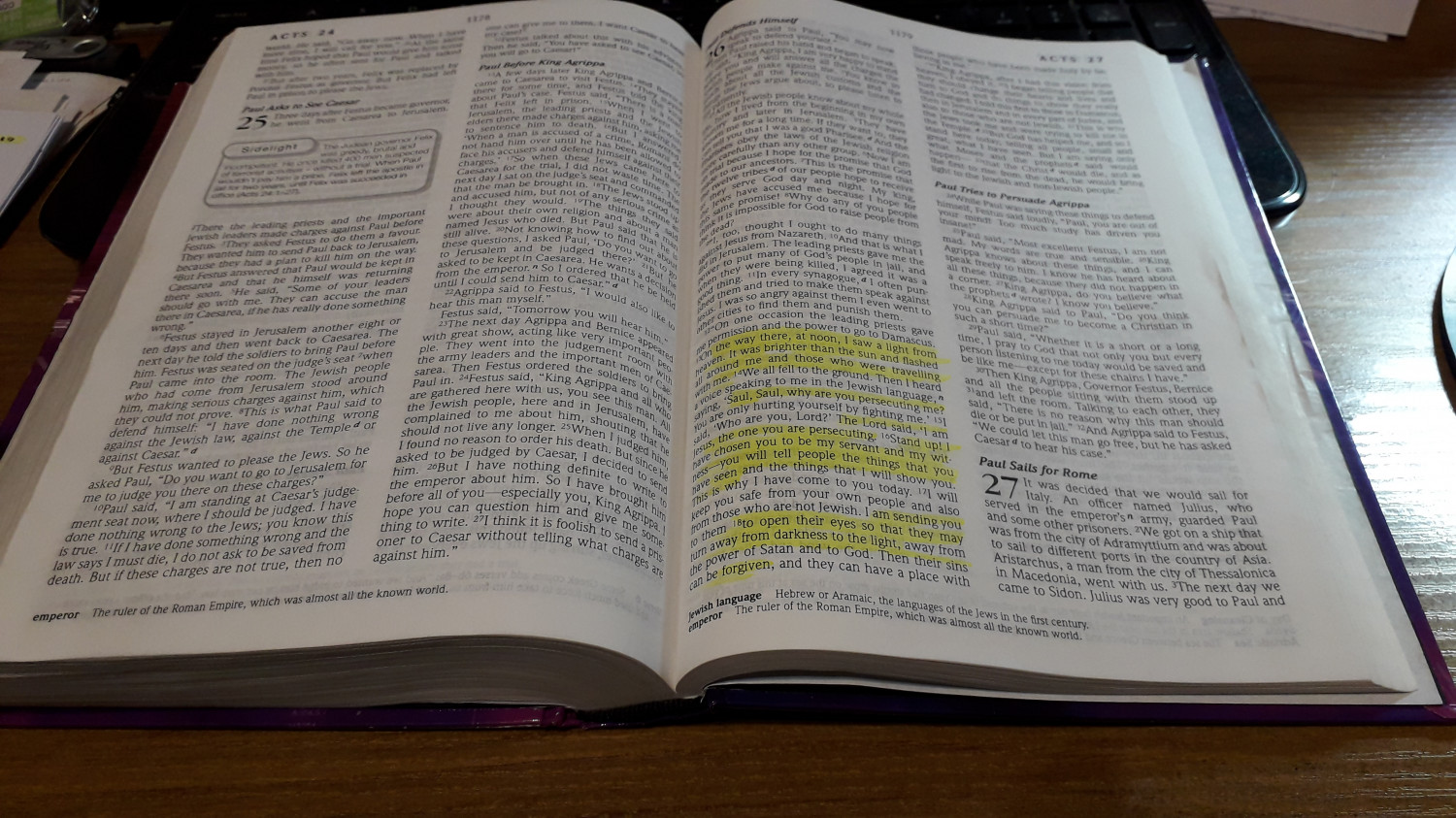11 July. Paul tells his story to King Agrippa
"Then Paul raised his hand and began to speak. He said, 'King Agrippa, I am very happy to stand before you and will answer all the charges the Jewish people make against me... All the Jewish people know about my whole life, how I lived from the beginning in my own country [Cilicia] and later in Jerusalem... If they want to, they can tell you that I was a good Pharisee.'..."
"'On one occasion, the leading priests gave me permission and the power to go to Damascus [to arrest the followers of Jesus]. On the way there, at noon, I saw a light from heaven. It was brighter than the sun and flashed all around me... Then I heard a voice speaking to me in the Jewish language, 'Saul, Saul, why are you persecuting me?'..."
"'I said, "Who are you, Lord?" The Lord said, "I am Jesus, the one you are persecuting. Stand up! I have chosen you to be my servant and my witness - you will tell people the things you have seen and the things that I will show you."...'"
"'King Agrippa, after I had this vision from heaven, I obeyed it. I began telling people that they should change their hearts and lives and turn to God and do things to show they really had changed. I told this first to those in Damascus, then in Jerusalem and in every part of Judea, and also to those who are not Jewish.'"
"'This is why the Jews took me and were trying to kill me in the Temple.... But I am saying only what Moses and the prophets said would happen - that the Christ [the Messiah, the anointed one] would die, and as the first to rise from the dead, he would bring light to the Jewish and non-Jewish people.'"
"While Paul was saying these things, Festus said loudly, 'Paul, you are out of your mind! Too much study has driven you insane!' Paul said, 'Most excellent Festus, I am not mad. My words are true and sensible... King Agrippa, do you believe what the prophets wrote? I know you believe.'"
"King Agrippa said to Paul, 'Do you think you can persuade me to become a Christian in such a short time?' Paul said, 'Whether it is a short or a long time, I pray to God that not only you but every person listening to me today would be saved and be like me - except for these chains I have.'"
"Then King Agrippa, Governor Festus, Bernice [Agrippa's sister] and all the people sitting with them stood up and left the room. Talking to each other they said, 'There is no reason why this man should die or be put in jail.' And Agrippa said to Festus, 'We could let this man go free, but he has asked Caesar [Emperor Nero] to hear his case.'"
(Acts 26:1-32)

Governor Festus asked Paul to stand and defend himself before King Agrippa, so Paul told his amazing story to Agrippa. He started with his impeccable credentials as a Jewish Pharisee, then recounted his encounter with Jesus on the road to Damascus.
This is the third time that Luke describes Paul's conversion experience to his readers of the 'Acts of the Apostles'. The first time (in Acts 9:3-9), we were told about Paul's journey to Damascus in the context of the persecution of Jesus's followers after the death of Stephen in 35AD. The second time (in Acts 22:5-11), Paul was speaking to the Jewish people from the steps of the Antonia Fortress after his arrest in Jerusalem in 57AD. The third time, in today's passage (in Acts 26:12-18) Paul is addressing King Agrippa and Governor Festus two years later.
Each time, the details of the story are slightly different (as you'd expect when someone re-tells a story many years later). For example, in the first account, the people travelling with Paul heard a voice but saw no-one (Acts 9:7); in the second, Paul's travelling companions didn't hear the voice but saw the light (Acts 22:9); and on the third re-telling they saw the light and fell to the ground (Acts 26:13-14).
Those who believe every word of the Bible to be literally true find these differences difficult to explain, but those who understand how stories change as they are re-told over time point to these subtle differences as evidence of a genuine first-hand account, rather than a formulaic re-telling of an established folktale.
In each case, of course, the significant elements of the story are the same: Paul had a vison of the risen Lord Jesus and, as a result, was changed from being a vicious persecutor of a dead man's followers to an ardent supporter and protagonist of a resurrected and living saviour.
So Paul re-told his story to the assembled dignitaries, and when he said that Jesus rose from the dead, Governor Festus declared, “Paul, you are out of your mind!” (Acts 26:24). King Agrippa was not so dismissive, but said, "Do you think you can persuade me to become a Christian in such a short time?" (Acts 26:27).
What Governor Festus and King Agrippa both agreed is that Paul didn’t deserve to be imprisoned, and there were no grounds for a death sentence. So Agrippa added “We could let this man go free, but he has asked Caesar to hear his case” (Acts 26:32).
The photo shows today's Bible passage in the New Century Version published by Thomas Nelson.
You can read what happened next tomorrow or @ https://www.thebiblejourney.org/…/…/paul-sets-sail-for-rome/.
